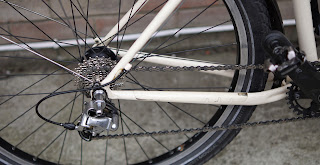Sunrise is progressively shy and I’m often out at 5am, which is perfect for testing lights. I’ve been gaining familiarity with the Sigma Blaze and Infinity rear lights. In terms of modes, these have a single, steady beam, reckoned visible to 500metres. The Blaze has an ambient light sensor, which will engage the light, to suit conditions-aside from the darker months, it will theoretically switch on when you’re riding through a tunnel/underpass.
Now, StVZO (German lighting standards) dictate that lights cannot flash; hence these are steady only. The beam must also “cut off” at the top, which prevents approaching traffic from being dazzled- the same basic principle as dipped car lights.
The Blaze features a “braking function” which engages all three diodes during the day, the lower two diodes at night. One press off the power button primes the ambient light mode, two presses gets you the night setting. Output is impressive, especially given the single, steady mode.
In common with other lights with “braking” functions, this puts a big dent in the run times, especially when your route involves a few climbs and/or you’re hauling a trailer/tagalong. I should also point out these are designed to be post, rather than frame-mounted but I’m keen to see if there’s any practical reason for not doing so.
Lighting aside, while the days are sufficiently long, temperate and relatively dry, I’m trying to get some serious miles on the Teenage Dream, before it goes into seasonal hibernation, around mid-October. I’m using this time to prep my fixed gear winter/trainer and Ursula for the wetter, darker months when reliability is key.
Both have been stripped and re-greased recently, so that’s one major bit of prep done. I also want to see how well the Peaty’s Speed GreasePEATY'S SPEED GREASE | cycling-not-racing (sevendaycyclist.com) and Bicycle Assembly Grease PEATY'S BICYCLE ASSEMBLY GREASE | cycling-not-racing (sevendaycyclist.com) Then of course, I’ve recently overhauled Ursula’s drivetrain and cables, so aside from keeping an eye on the chain (which will almost inevitably wear faster, given the mix of stouter lubes, and wet, gritty lanes) tyres are the only other immediate consideration.
Plan is to run the Marathon Mondial Double Defense Tyre until October, then switch to the Marathon GT365 TESTED: SCHWALBE MARATHON GT 365 TYRES WINTER UPDATE (sevendaycyclist.com). Other possibilities include the 26x1.95 version of these Kenda Kwick Journey KS Plus KENDA KWICK JOURNEY TYRES | cycling-not-racing (sevendaycyclist.com) or their K935, at the right price. Talking of the Kenda Kwick Journey KS Plus, I may switch the fixed’s Bontrager in their favour.
There is a lot to be said for building a machine solely for winter. Traditionally, this has followed the old road frameset built up with hand-me-down components narrative. There’s a lot to be said for this recycling. Older components that aren’t snappy enough for racing are usually, still very serviceable. Stouter tyres, full, or “race blade” type guards, fresh cables and bar tape, lights and with some basic care, it’ll protect you and your best bike(s) expensive components from wet, gritty, dark and destructive stuff.
The flipside of the best bike, really. It only gets used for that season, so while arguably it sees the harshest weather, it isn’t necessarily hardest used. A four season’s bike by contrast is usually so versatile, they become year-round go-tos. Hence why most of my general riding is spread between Ursula and my fixed gear “cyclo crosser with track ends”
On a very personal note, if I was going for a strictly winter build, I’d probably go for a single speed cyclocross route.
Track ends, clearance for 700x42c, (probably 35mm default, such as the Kenda Kwick Journey KS Plus and buying more clearance should I want to run winter spikes when roads turn more spiteful than a tabloid headline) full-length mudguards, dyno hub powered front lighting.
Charge Plug1 was a very fetching, sub £500 package and would’ve fitted this bill rather nicely. That said; though the semi-compact geometry frameset might’ve ticked all these boxes, the 6061 tubes and fork, might’ve been a little “direct”.
Fixed and single speed drivetrains still need monitoring/inspection (I tend to get through a fixed chain in around 3,000miles) but much cheaper and simpler to keep happy, since there are fewer moving parts to wear out.
However, as my beloved fixed gear winter/trainer proves, you’ll still need to keep an eye on cable and brake pad wear, even if you’re going the single stopper route. I also spotted some KMC chains going seriously cheap, so snapped them up and have only just needed to replenish the Peaty’s Link Lube All Weather- the original helping had gone way past the 500-mile marker.
At the other end of a very different machine, I have received this Axiom Citypack 6+. It’s a quick-release system that mounts high up (beneath the saddle rails) but the similarities with the venerable SQR Tour pretty much end here.
The outer fabric is made from recycled polyester with a waterproof polyurethane coating. More interesting and in keeping with Ursula’s compact geometry, it's intended to address limited wheel/frame clearance, or those who like rack top/trunk bags but don’t fancy being encumbered by a rack.








No comments:
Post a Comment